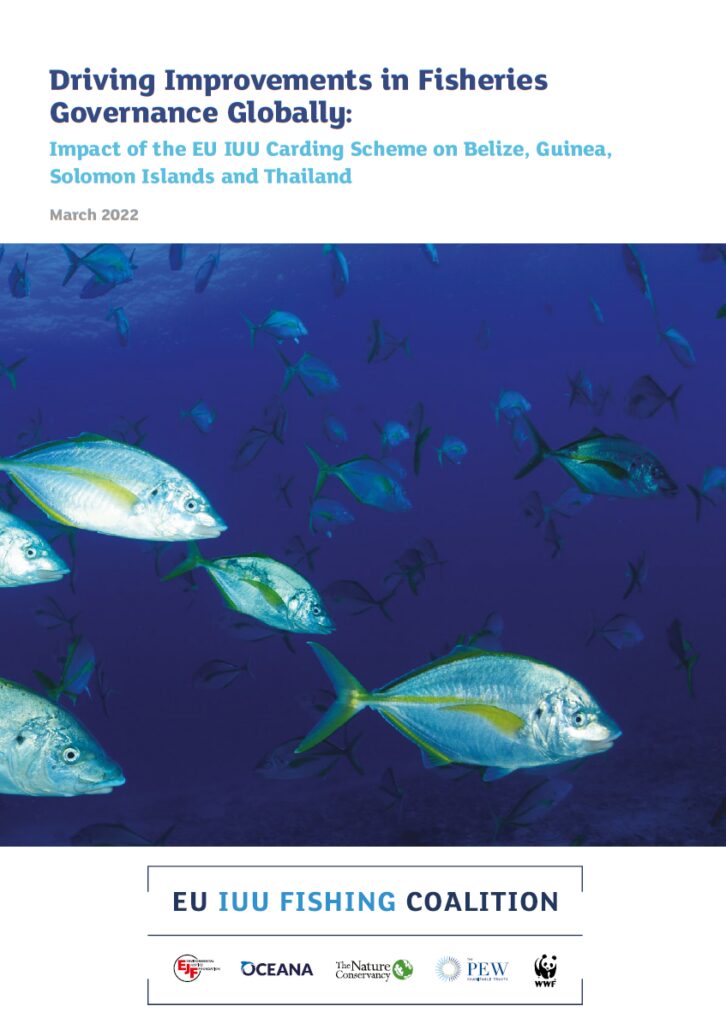Report | April 6, 2022
Driving Improvements in Fisheries Governance Globally: Impact of the EU IUU Carding Scheme on Belize, Guinea, Solomon Islands and Thailand
The European Union’s Regulation establishing a Community system to prevent, deter and eliminate illegal, unreported and unregulated (IUU) fishing is a world-leading legal instrument designed to stop the flow of IUU-caught fish entering the EU market. One key component of the so-called ‘IUU Regulation’ is the EU’s cooperation and ongoing dialogues with third countries, through which a formal warning (or ‘yellow card’) may be issued to non-EU countries pre-identified by the EU as non-cooperating countries in the fight against IUU fishing. This warning commences a formal engagement between the EU and the yellow-carded country, in which the EU seeks to provide assistance in tackling the shortcomings that have been identified. If sufficient action is not taken to improve performance, the third country further risks being identified as a non-cooperating country pursuant to the IUU Regulation (‘red card’) – excluding fish caught by the carded country’s vessels from being exported to the EU, and preventing EU vessels operating in their waters, amongst other restrictions. Yellow and red cards may be removed once the EU deems sufficient efforts have been made by the carded country to address identified shortcomings. One of the desired outcomes of the carding scheme is to engender lasting, positive country-level changes in the fisheries governance and anti-IUU fishing measures in non-EU countries. Now, over ten years since the Regulation came into force, this report builds on prior research to highlight instances in which the EU carding scheme has prompted positive changes in fisheries governance in four case study countries: Belize, Guinea, Solomon Islands and Thailand. Through interviews with key informants, and extensive desk-based research, improvements in fisheries governance are measured across three key indicators:
1. Legislation and regulation,
2. Compliance and enforcement, and
3. Prevalence.
Fisheries governance in all four of the case studies has demonstrably changed following carding from the EU. Improvements are being made and indicators point to real, tangible progress; with the EU carding scheme appearing particularly effective at improving legislative arrangements in non-cooperating countries. In addition, there were also improvements in relation to compliance and enforcement, and reducing the prevalence of IUU fishing, which are believed to be at least partially attributable to the carding scheme – notably through efforts to strengthen monitoring, control and surveillance (MCS) measures, as well as participation in relevant international agreements and initiatives designed to reduce IUU fishing and associated issues. The report also suggests that there are social, economic and environmental benefits that have, or are likely to, arise following theseimprovements – however the relatively short time period that has passed since the governance improvementsmake these difficult to quantify.
Whilst the carding study is believed to have brought about fisheries governance improvements in the case study countries, there remains scope for both further research into its effectiveness and shortcomings through additional case studies and alternative methodologies. In addition, this report also makes a series of recommendations regarding the carding scheme and how it can be improved. First, it recommends that relevant teams within the EU are resourced and funded adequately so as to ensure the continued effectiveness of the carding scheme. Second, it is recommended that the EU explores the possibility of expanding the scheme, particularly to other key market States, to reduce the likelihood of IUU-caught fish being diverted to alternate markets. Third, it is recommended that the technical support and development assistance provided by the EU to third countries involved in the carding process should be expanded. Fourth, the report recognises that when the carding scheme was introduced it was criticised for being insufficiently transparent and therefore recommends that updates on dialogues continue to be made to Advisory Councils, which include NGOs and industry. Finally, recognising the importance of transparency in identifying and resolving issues related to IUU fishing, it is recommended that the EU uses all available fora, including those outside the carding process, to encourage third countries to adopt transparency reforms.



